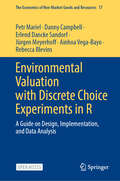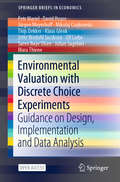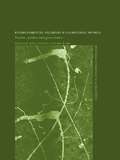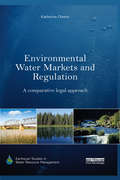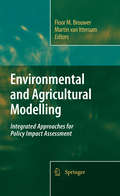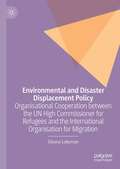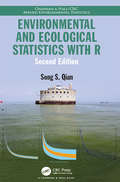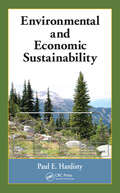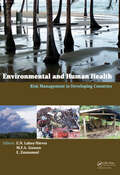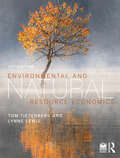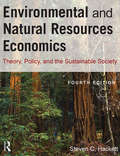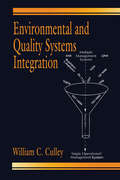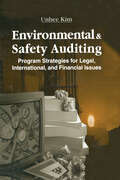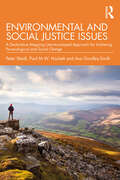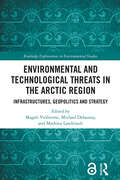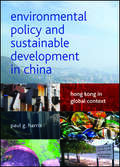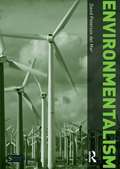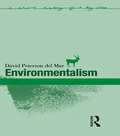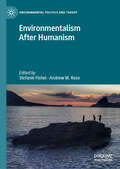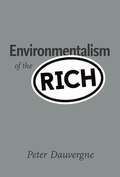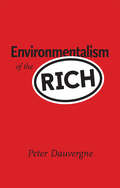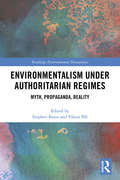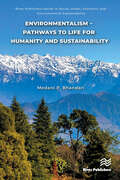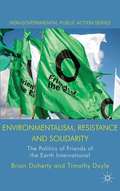- Table View
- List View
Environmental Valuation with Discrete Choice Experiments in R: A Guide on Design, Implementation, and Data Analysis (The Economics of Non-Market Goods and Resources #17)
by Danny Campbell Petr Mariel Jürgen Meyerhoff Erlend Dancke Sandorf Ainhoa Vega-Bayo Rebecca BlevinsThis open access book offers advice and practical guidance for conducting discrete choice experiments (DCEs) in environmental valuation. It covers essential aspects of designing, implementing, and analysing choice experiments. Each chapter includes scripts and guidance, showcasing how to execute every step of a DCE using the free statistical computing and graphics software, R. This feature enhances accessibility and versatility for researchers in the field. While not providing strict guidelines, the book assists readers in steering clear of common mistakes encountered in applied work. With its insights and expertise, it equips researchers and practitioners to effectively navigate the complexities of DCEs.
Environmental Valuation with Discrete Choice Experiments: Guidance on Design, Implementation and Data Analysis (SpringerBriefs in Economics)
by Julian Sagebiel Petr Mariel David Hoyos Jürgen Meyerhoff Mikolaj Czajkowski Thijs Dekker Klaus Glenk Jette Bredahl Jacobsen Ulf Liebe Søren Bøye Olsen Mara ThieneThis open access book offers up-to-date advice and practical guidance on how to undertake a discrete choice experiment as a tool for environmental valuation. It discusses crucial issues in designing, implementing and analysing choice experiments. Compiled by leading experts in the field, the book promotes discrete choice analysis in environmental valuation through a more solid scientific basis for research practice. Instead of providing strict guidelines, the book helps readers avoid common mistakes often found in applied work. It is based on the collective reflections of the scientific network of researchers using discrete choice modelling in the field of environmental valuation (www.envecho.com).
Environmental Values in a Globalizing World: Nature, Justice and Governance (Challenges of Globalisation #Vol. 3)
by Ian Lowe Jouni PaavolaThis multidisciplinary volume presents a refreshing new approach to environmental values in the global age. it investigates the challenges that globalization poses to traditional environmental values in general as well as in politics and international governance.Divided into five parts, the book investigates how environmental values could be reconceived in a globalizing world.Part I explores contemporary environmental values and their implications for a globalizing world.Part II examines the development of Western and Eastern environmental valuesPart III discusses contemporary environmental politicsPart IV examines how values inform environmental governance and how governance solutions influence which values are realisedPart V concludes the volume with two different views of the prospects of environmental values in a globalising world. This study will be of great interest to students and researchers studying the environment in philosophy, political science, international relations, international environment law, environmental studies and development studies.
Environmental Water Markets and Regulation: A comparative legal approach (Earthscan Studies in Water Resource Management)
by Katherine OwensRiver systems around the world are degraded and are being used unsustainably. Meeting this challenge requires the development of flexible regimes that have the potential to meet essential consumptive needs while restoring environmental flows. This book focuses on how water trading frameworks can be repurposed for environmental water recovery and aims to conceptualise the most appropriate role for law in supporting recovery through these frameworks. The author presents a comprehensive study of the legal frameworks in four jurisdictions: the States of Oregon and Colorado in the western United States; the province of Alberta in Canada; and the Murray-Darling Basin in Australia/Basin State of New South Wales. A close comparative analysis of these four jurisdictions reveals a variety of distinctive regulatory arrangements and collaborations between public and private actors. In all cases, the law has been deployed to steer and coordinate these water governance activities. The book argues that each regime is based on a particular regulatory strategy, with different conceptions of the appropriate roles for, and relationships between, various actors and institutions. Legal frameworks do not have the capacity to rationalise and provide an overarching and absolute solution to the complex environmental and governance issues that arise in the context of environmental water transactions. Rather, the role of law in this context needs to be reconceptualised within the paradigm of regulatory capitalism as establishing and maintaining the limits within which regulatory participants can operate, innovate and collaborate.
Environmental and Agricultural Modelling:
by Martin Van Ittersum Floor M. BrouwerAgriculture increasingly faces the challenge of balancing its multiple functions in a sustainable way. Integrated assessment and modelling (IAM) can provide insight into the potential impacts of policy changes. However, concepts to address the wide range of issues and functions typical for agriculture are still scarce. Environmental and Agricultural Modelling reviews and presents our current understanding of integrated and working tools to assess and compute, ex-ante, alternative agricultural and environmental policy options, allowing: 1. Analysis at the full range of scales (farm to European Union and global) whilst focusing on the most important issues emerging at each scale; 2. Analysis of the environmental, economic and social contributions of agricultural systems towards sustainable rural development and rural viability; 3. Analysis of a broad range of issues and agents of change, such as climate change, environmental policies, rural development options, effects of an enlarging EU, international competition, and effects on developing countries.
Environmental and Disaster Displacement Policy: Organisational Cooperation between the UN High Commissioner for Refugees and the International Organisation for Migration
by Silvana LakemanThis book explores the involvement of the United Nations High Commissioner for Refugees (UNHCR) and the International Organization for Migration (IOM) in the issue area of environmental and disaster displacement. In considering both agencies’ historical involvement, their response to Typhoon Haiyan, and first-hand accounts from both agency staff and other experts, this book outlines how inter-agency involvement in the issue area has been categorised by (real or imagined) divisions; of agency structures and mandates, activities, and even personalities. While historically inherited differences exist, environmental and disaster displacement has led to a converging of agency roles and amplified tensions, at a time when cooperation is most critical.
Environmental and Ecological Statistics with R (Chapman & Hall/CRC Applied Environmental Statistics)
by Song S. QianEmphasizing the inductive nature of statistical thinking, Environmental and Ecological Statistics with R, Second Edition, connects applied statistics to the environmental and ecological fields. Using examples from published works in the ecological and environmental literature, the book explains the approach to solving a statistical problem, covering model specification, parameter estimation, and model evaluation. It includes many examples to illustrate the statistical methods and presents R code for their implementation. The emphasis is on model interpretation and assessment, and using several core examples throughout the book, the author illustrates the iterative nature of statistical inference. The book starts with a description of commonly used statistical assumptions and exploratory data analysis tools for the verification of these assumptions. It then focuses on the process of building suitable statistical models, including linear and nonlinear models, classification and regression trees, generalized linear models, and multilevel models. It also discusses the use of simulation for model checking, and provides tools for a critical assessment of the developed models. The second edition also includes a complete critique of a threshold model. Environmental and Ecological Statistics with R, Second Edition focuses on statistical modeling and data analysis for environmental and ecological problems. By guiding readers through the process of scientific problem solving and statistical model development, it eases the transition from scientific hypothesis to statistical model.
Environmental and Economic Sustainability
by Paul E. HardistyNever before has the quest to balance the needs of people, the environment, and the economy been so important. While sustainability has been widely taken up by governments and business, the world has continued to move in increasingly unsustainable directions, from continued dependence on fossil energy to rising greenhouse gas emissions, and erosion
Environmental and Human Health: Risk Management in Developing Countries
by Eddie N. Laboy-Nieves Mattheus F. A. Goosen Evens EmmanuelMany countries experience lack of harmony among economic development, environmental management and human health. As a consequence, public health, the integrity of ecosystems, and the efforts to reach environmental sustainability, have been adversely affected. The complexity, frequency and magnitude of those impacts is increasingly parallel to the t
Environmental and Natural Resource Economics
by Tom Tietenberg Lynne LewisEnvironmental and Natural Resource Economics is one of the most widely used textbooks for environmental economics and natural resource economics courses, offering a policy-oriented approach and introducing economic theory and empirical work from the field. Students will develop a global perspective of both environmental and natural resource economics and how they interact. This 12th edition provides updated data, new studies, and more international examples. There is a considerable amount of new material, with a deeper focus on climate change and coverage of COVID-19, social justice, and the circular economy. Key features include: Extensive coverage of major contemporary issues including climate change, water and air pollution, resource allocation, biodiversity protection, sustainable development, and environmental justice. Four chapters specifically devoted to climate economics, including chapters on energy, climate mitigation, carbon pricing, and adaptation to climate change. Introductions to the theory and method of environmental economics, including externalities, benefit-cost analysis, valuation methods, and ecosystem goods and services and updates to the social cost of carbon. New examples and debates throughout the text, highlighting global cases and major talking points. Environmental and Natural Resource Economics supports students with end-of-chapter summaries, discussion questions, exercises, and further reading in the book, and the companion website offers additional learning and teaching resources.
Environmental and Natural Resources Economics: Theory, Policy, and the Sustainable Society
by Steven C. HackettExtensively revised and updated, this popular text presents an accessible yet rigorous treatment of environmental and natural resources economics, including climate change and the economics of sustainability. Completely revised and updated, the fourth edition now includes new figures and tables, definitions to assist the reader, and updated policy information. New advances in the science, economics and policy approaches to climate change have been integrated into essentially all-new chapters on incentive regulation and global climate change. This innovative textbook integrates economics with science and public policy in a balanced and accessible way that will be appreciated by students from disciplines ranging from economics and natural resources management to environmental studies and energy policy.
Environmental and Quality Systems Integration
by William C. CulleyGlobal competition, corporate downsizing and corporate restructuring have forced many firms to reevaluate their operating methods. Today, corporations must do more with less while still watching the bottom line and improving profitability. ISO 14000 and ISO 9000, because of their similar management system requirements and auditing procedures, are g
Environmental and Safety Auditing: Program Strategies for Legal, International, and Financial Issues
by Unhee KimThis is a complete and concise guide to creating and managing a successful environmental audit program. It provides step-by-step guidance on setting up an audit program for nearly every major component of environmental concern, from air standards to workplace safety, and from effluent discharge to waste handling and disposal.
Environmental and Social Justice Issues: A Declarative Mapping Literature-based Approach for Achieving Pro-ecological and Social Change
by Paul M.W. Hackett Ava Gordley-Smith Peter SteidlThis book uses a declarative mapping methodology to examine a range of issues relating to environmental and social justice issues, including climate change, homelessness, refugees, food insecurity, and racial and gender inequality. The book explores how we can bring about change in order to have a meaningful impact on these problems, using a literature-based approach to identify and analyse this through the Declarative Mapping Method, showing how this methodology can be used in the context of these issues. The authors build a body of knowledge based upon published research, to offer a template that may be used to bring about meaningful and appropriate changes in human behaviour in a variety of social/ecological justice contexts. In a world where most of the global challenges we face are a result of human behaviour, the book applies psychological principles to gain a deeper understanding of our responses to world issues. Case studies are included to show how specific strategies can be used to address problems, and a holistic perspective offers strategies and insights into addressing these challenges. This is an ideal text for researchers and students interested in environmental and social issues, especially those looking to find ways to address them through research methodologies.
Environmental and Socioeconomic Vulnerabilities and Resilience in Small States (Europa International Perspectives)
by Verena Tandrayen-RagooburSmall states face a number of challenges, mainly because of their geographical positioning and inherent characteristics, such as small populations, limited resources endowment and market constraints that make them more vulnerable to exogenous economic shocks. Climate change is adding a further layer of difficulty, making it more challenging to build long-lasting resilience. Building resilience in small states is crucial to enhance their capacity to address external shocks, however, this can vary depending on the specific context, geographical location and the socioeconomic conditions of each country. Tailored approaches and solutions are necessary to address the unique challenges faced by individual small states.This volume, which adopts a humanitarian and development approach to address risks, vulnerability and resilience of populations in small states exposed to shocks, contributes to the growing academic literature on economic, environmental, social and climate vulnerability and resilience. In conjunction with efforts to address root causes of vulnerabilities, promote social justice and foster sustainable development, the book explores whether there is a more holistic approach that combines resilience with a focus on equity, social change and transformative actions, which can enhance the effectiveness of resilience efforts.Written by experts in the field of small states and small island developing states, this book is an invaluable tool for those researching the impact of contemporary environmental and socioeconomic issues on small states worldwide.
Environmental and Technological Threats in the Arctic Region: Infrastructures, Geopolitics and Strategy (Routledge Explorations in Environmental Studies)
by Mathieu Landriault Magali Vullierme Michael DelaunayArctic subregions have undergone major structural changes in the past few decades. Looking past traditional military and geopolitical understandings of these regions, this book focuses rather on climate change and on the emergence of the digital economy and its infrastructures as two of the most fundamental challenges for Arctic communities and inhabitants.To this end, Section I, on Arctic (re)newned environment, focuses on the acceleration of permafrost thaw, protection of submarine cables, and the importance of an all-domain military approach. Section II analyses infrastructure challenges linked to this “new” Arctic environment, providing examples within maritime, transportation, and digital-physical infrastructures. Finally, Section III provides results of research focusing on the emerging geopolitical and strategic threats posed by data routes, technological dependencies, cryptocurrency mining, and disinformation. Over the course of the book, authors offer practical insights into how to tackle these threats, lessons learned, best practices, and recommendations. By bringing together analyses from a range of authors from different interdisciplinary backgrounds, the book provides a holistic understanding of these phenomena.This volume will be useful for students, scholars, and researchers of Arctic studies, environmental governance, and environmental security.
Environmental policy and sustainable development in China: Hong Kong in Global Context
by Paul G. HarrisDrawing on practices and theories of sustainability, Environmental policy and sustainable development in China explores the prospects for achieving environmentally benign economic and social development in China and beyond. Using the Chinese 'world city' of Hong Kong as a backdrop and case study, it introduces major conceptions of sustainability, describes historical and political contexts for environmental policymaking, and analyses key challenges related to sustainable development, including air pollution, water quality, waste, transport and climate change. The book will be a valuable and unique resource for students, teachers and readers interested in environmental policy, sustainable development and ecological governance, especially in China and Hong Kong. All of the author's royalties from sales of this book will be donated by Policy Press to Friends of the Earth (Hong Kong) and WWF (Hong Kong).
Environmentalism (Seminar Studies)
by David Peterson Del MarWhy are our environmental problems still growing despite a huge increase in global conservation efforts? Peterson del Mar untangles this paradox by showing how prosperity is essential to environmentalism. Industrialization drove people to look for meaning in nature even as they consumed its products more relentlessly. Hence England led the way in both manufacturing and preserving its countryside, and the United States created a matchless set of national parks as it became the world's pre-eminent economic and military power.Environmental movements have produced some impressive results, including cleaner air and the preservation of selected species and places. But agendas that challenged western prosperity and comfort seldom made much progress, and many radical environmentalists have been unabashed utopianists. Environmentalism considers a wide range of conservation and preservation movements and less organized forms of nature loving (from seaside vacations to ecotourism) to argue that these activities have commonly distracted us from the hard work of creating a sustainable and sensible relationship with the environment.
Environmentalism (Short Histories of Big Ideas)
by David Peterson Del MarEnvironmental movements have produced some impressive results, including cleaner air and the preservation of selected species and places. But movements that challenged western prosperity and comfort seldom made much progress, and many radical environmentalists have been unabashed utopianists. In this short guide, Peterson del Mar untangles this paradox by showing how prosperity is essential to environmentalism. Industrialisation made conservation sensible, but also drove people to look for meaning in nature even as they consumed its products more relentlessly. Hence Englandled the way in both manufacturing and preserving its countryside, and the United Statescreated a matchless set of national parks as it became the world's pre-eminent economic and military power. Environmentalismconsiders both the conservation and preservation movements and less organized forms of nature loving (from seaside vacations to ecotourism) to argue that these activities have commonly distracted us from the hard work of creating a sustainable and sensible relationship with the environment.
Environmentalism After Humanism (Environmental Politics and Theory)
by Andrew M. Rose Stefanie FishelThis book explores the ways in which one might come to recognize and better theorize the political actor, and the political ‘act,’ or ‘event,’ in a post-anthropocentric context. The challenge to contemporary ideas of citizenship, activism, and the state stems not only from the realization that the natural world is inseparable from the social, but that both are the product of hybridized human and nonhuman agencies. As a result, one must be skeptical of any notion of an environmental fix that bases itself upon an exclusively human agency. What new types of citizenship might emerge from posthuman cultures and artforms? What do effective post-anthropocentric organizing strategies look like? As the relevance of the liberal humanist political subject and the conceptual posthuman of political realism recede, theories of national and international politics are now tasked with rethinking a contemporary environmental politics beyond humanism. To better theorize these destabilizations, this collection puts forth the value of thinking across disciplines, wherein a conversation unfolds between political theory and literary theory that meets at the crossroads of environmental humanities and ecopolitical theory.
Environmentalism of the Rich
by Peter DauvergneOver the last fifty years, environmentalism has emerged as a clear counterforce to the environmental destruction caused by industrialization, colonialism, and globalization. Activists and policymakers have fought hard to make the earth a better place to live. But has the environmental movement actually brought about meaningful progress toward global sustainability? Signs of global "unsustainability" are everywhere, from decreasing biodiversity to scarcity of fresh water to steadily rising greenhouse gas emissions. Meanwhile, as Peter Dauvergne points out in this provocative book, the environmental movement is increasingly dominated by the environmentalism of the rich -- diverted into eco-business, eco-consumption, wilderness preservation, energy efficiency, and recycling. While it's good that, for example, Barbie dolls' packaging no longer depletes Indonesian rainforest, and that Toyota Highlanders are available as hybrids, none of this gets at the source of the current sustainability crisis. More eco-products can just mean more corporate profits, consumption, and waste.Dauvergne examines extraction booms that leave developing countries poor and environmentally devastated -- with the ruination of the South Pacific island of Nauru a case in point; the struggles against consumption inequities of courageous activists like Bruno Manser, who worked with indigenous people to try to save the rainforests of Borneo; and the manufacturing of vast markets for nondurable goods--for example, convincing parents in China that disposable diapers made for healthier and smarter babies.Dauvergne reveals why a global political economy of ever more -- more growth, more sales, more consumption -- is swamping environmental gains. Environmentalism of the rich does little to bring about the sweeping institutional change necessary to make progress toward global sustainability.
Environmentalism of the Rich
by Peter DauvergneWhat it means for global sustainability when environmentalism is dominated by the concerns of the affluent—eco-business, eco-consumption, wilderness preservation. Over the last fifty years, environmentalism has emerged as a clear counterforce to the environmental destruction caused by industrialization, colonialism, and globalization. Activists and policymakers have fought hard to make the earth a better place to live. But has the environmental movement actually brought about meaningful progress toward global sustainability? Signs of global “unsustainability” are everywhere, from decreasing biodiversity to scarcity of fresh water to steadily rising greenhouse gas emissions. Meanwhile, as Peter Dauvergne points out in this provocative book, the environmental movement is increasingly dominated by the environmentalism of the rich—diverted into eco-business, eco-consumption, wilderness preservation, energy efficiency, and recycling. While it's good that, for example, Barbie dolls' packaging no longer depletes Indonesian rainforest, and that Toyota Highlanders are available as hybrids, none of this gets at the source of the current sustainability crisis. More eco-products can just mean more corporate profits, consumption, and waste. Dauvergne examines extraction booms that leave developing countries poor and environmentally devastated—with the ruination of the South Pacific island of Nauru a case in point; the struggles against consumption inequities of courageous activists like Bruno Manser, who worked with indigenous people to try to save the rainforests of Borneo; and the manufacturing of vast markets for nondurable goods—for example, convincing parents in China that disposable diapers made for healthier and smarter babies. Dauvergne reveals why a global political economy of ever more—more growth, more sales, more consumption—is swamping environmental gains. Environmentalism of the rich does little to bring about the sweeping institutional change necessary to make progress toward global sustainability.
Environmentalism under Authoritarian Regimes: Myth, Propaganda, Reality (Routledge Environmental Humanities)
by Viktor Pál Stephen BrainSince the early 2000s, authoritarianism has risen as an increasingly powerful global phenomenon. This shift has not only social and political implications, but also environmental implications: authoritarian leaders seek to recast the relationship between society and the government in every aspect of public life, including environmental policy. When historians of technology or the environment have investigated the environmental consequences of authoritarian regimes, they have frequently argued that authoritarian regimes have been unable to produce positive environmental results or adjust successfully to global structural change, if they have shown any concern for the environment at all. Put another way, the scholarly consensus holds that authoritarian regimes on both the left and the right generally have demonstrated an anti-environmentalist bias, and when opposed by environmentalist social movements, have succeeded in silencing those voices. This book explores the theme of environmental politics and authoritarian regimes on both the right and the left. The authors argue that in instances when environmentalist policies offer the possibility of bolstering a country’s domestic (nationalist) appeal or its international prestige, authoritarian regimes can endorse and have endorsed environmental protective measures. The collection of essays analyzes environmentalist initiatives pursued by authoritarian regimes, and provides explanations for both the successes and failures of such regimes, looking at a range of case studies from a number of countries, including Brazil, China, Poland, and Zimbabwe. The volume contributes to the scholarly debate about the social and political preconditions necessary for effective environmental protection. This book will be of great interest to those studying environmental history and politics, environmental humanities, ecology, and geography.
Environmentalism – Pathways to Life for Humanity and Sustainability (River Publishers Series in Social, Urban, Economic and Environmental Sustainability)
by Medani P. BhandariThis is a comprehensive exploration of the diverse challenges and solutions related to environmentalism and sustainability. It bridges the gaps between theory and practice, offering practical insights for academics, policymakers, and change agents. It also inspires informed action and collaborative efforts for creating a sustainable future, offering new knowledge to those who care deeply about the planet and humanity’s future.The book begins with the evolution of environmentalism; tracing how ecological awareness has shaped global movements and policies. It also delves into theories of sustainability, demonstrating their relevance in addressing contemporary environmental crises. Central to the discussion is the concept of resource inequality, revealing how disproportionate resource access hinders global development and sustainability. It also explores the sustainable development goals (SDGs), presenting them as vital frameworks for policy and action, alongside climate change mitigation strategies like renewable energy, carbon sequestration, and biodiversity conservation. In the context of social equity and environmental justice, it addresses global disparities, underscoring the need for inclusive and fair solutions.Technological innovation is presented as a key driver for transforming economies into more sustainable models, including the circular economy and green finance. Furthermore, the book highlights behavioral change, mental health, and well-being as integral to advancing environmentalism.Corporate responsibility and global cooperation are examined for their roles in driving collective action, and the book emphasizes the importance of these stakeholders in addressing the environmental crisis. It also introduces the epistemology of the development economy, providing a fresh lens on sustainability that can inform both academic inquiry and practical applications.
Environmentalism, Resistance and Solidarity
by Brian Doherty Timothy DoyleIn the first detailed study of how a major environmental NGO works transnationally, Brian Doherty and Timothy Doyle examine the relationships between the 74 national organizations of Friends of the Earth International. Drawing from a rich mix of survey data, interviews, archival sources and access to internal meetings, they show how FoEI has developed a distinctive international environmentalism, which allows for the differences in context between regions and across the North-South divide. Following the expansion of FoEI into the global South, the challenges it then faced over questions of ideology, organization and campaign strategy are examined over a twenty year period. The book demonstrates the development of an FoEI tradition of solidarity which accounts for its ability to overcome internal crises and pursue joint campaigns despite conflicting understandings of politics between its national organizations.
